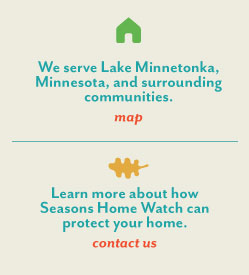REASONABLE CARE and VACANT vs UNOCCUPIED HOMES
posted on August 8th, 2015
REASONABLE CARE
According to WiseGEEK.com, Reasonable care is the level of care which an ordinary and reasonable person would use under comparable circumstances. In the law, it is used as a standard to assess liability. If it can be demonstrated that someone had a duty of care and failed to exercise reasonable care, that person can be held negligent and may be liable for damages. On the other hand, if someone exhibited reasonable care and something happened anyway, this person would not be considered negligent.
How does this legal definition apply to you as an absentee homeowner? Homeowners insurance provides financial protection against disasters. A standard policy insures the home itself and the things you keep in it. Insurance companies use risk assessors called underwriters, who look at the chances the insurance company will have to pay, based on what information they know about you and your circumstances. With this information rates and coverage are set up. For your home, underwriters assume you are living in your home year-round. If it is a second home, they typically know the property is empty for a portion of the year. Before paying a claim on your other home, the insurance company may want proof that you took reasonable care to avoid the damage that occurred. Prior to having a problem, ask yourself:
- What steps did you take to reduce the chance of losses?
- Did you have a person checking the house regularly?
- What did this person look for?
- What was this person instructed to do if they encounter a problem such as a leak, furnace not working or broken widows?
Answers to each of these questions reflect the degree of reasonable care that you took to ensure unnecessary risks. A policy holder who has a home watch service looking after their home, that uses a check list to systematically check on your home and that has either an action plan or a contact list when they encounter an unforeseen event, would be more responsible than a homeowner that utilizes a “lock it up and leave it” approach to home ownership. To be safe, contact your insurance agent and ask specifically what they interpret as having taken reasonable care.
VACANT and FOR SALE HOMES
Insurance companies generally take a different view of vacant vs unoccupied homes. Most sellers believe that their for sale home, empty of their possessions, remains fully covered by their existing homeowner’s policy. Contact your insurance company if you are putting the house up for sale, especially if it will be vacant. An insurance company could cancel homeowners insurance or reduce the coverage after 30 days of a house becoming vacant, if they are not notified. This varies by state and by insurance companies. Home insurers will often work with you if you have a special situation for example, if you bought a new house and are waiting to sell your vacant house, but are still checking in on it. A house that is regularly checked on shouldn't look vacant, even though it is. Someone should pick up the mail, papers, mow the lawn, pick-up trash, branches, turn on lights, check for insects and rodents, keep up with the snow removal, park an occasional car in the driveway and do a thorough in home inspection. Anything that makes the home look ‘lived in” will make it an unattractive target for vandals and vagrants.
What if you have vacated the home but don’t want to leave it empty? Home Staging is very popular; it’s the art of decorating a house to sell quickly and for top dollar. For other clients, the home stager may furnish the entire home from top to bottom including bringing in furniture, accessories and art. Check with your insurance company about coverage for rented furnishings as well as the liability coverage with the home staging service.
Vacant homes are perceived a higher risk generally due to the fact that no one is in the house regularly. When there is an incident, damage can be more substantial if there is no one there to mitigate the issue by calling police, exterminator, utilities or plumber.
UNOCCUPIED HOMES
If you are like most typical snowbirds, migrating north for the summer and south for the winter, your homes probably fall into the classification as Unoccupied. You essentially maintain two homes and are a resident in each for a number of months during the year. The important distinction to most insurance companies is that there are personal valuables remaining in the house while you are gone and that you plan to return. Ask your insurance company if there will be any changes in your policy or reduction in coverage. Especially important to note if you are leaving a vehicle behind, will it sit idle and not be driven or started by someone occasionally. If you have a home watch person starting the car, make sure they are covered under your insurance policy. In addition, ask the insurance agent the following questions:
- Does your coverage decrease after 30 days?
- Is vandalism covered while you are gone?
- Broken windows or water leaks/damage covered?
- For vehicles that are left behind, what type of insurance is needed for coverage?
In the end, the best advice is this; If you must leave a house vacant or unoccupied, have someone periodically check both the outside and the inside of your home.
Seasons Home Watch is an experienced, bonded and insured service that can give you peace of mind next time you leave for an extended period. To learn more, contact Jeffrey or Rebecca Anderson:
info@seasonshomewatch.com
612-220-5934
SeasonsHomeWatch.com


